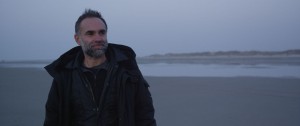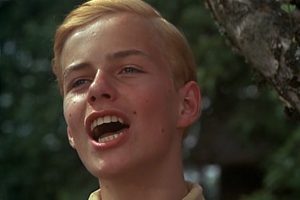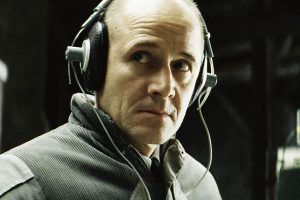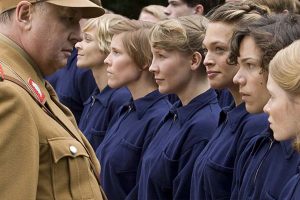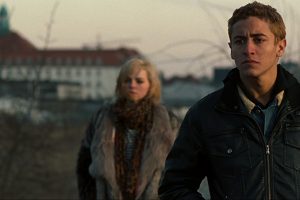Karim Ainouz is a director from Brazil, described by LITTLE WHITE LIES as “poised to become a major force in world cinema”. We sat down with Karim to talk about the themes and tensions in his new film – FUTURO BEACH.
FUTURO BEACH is at once a love story, a family story, a travel story…How did all of these elements evolve and come together in this film?
When we imagine the film, we thought of a story about courage and fear, about character that are brave and cowardly at the same time. We wanted to talk about the times we live in – when trepidation is everywhere. We have immersed ourselves in a conservative moment, a moment where religion, intolerance and a wish for stability are ever present. Adventure, risk-taking, and danger are no longer very welcome, so we pictured a story that could encompass all of that, a story that could be relevant – we imagined a film about passion, voyage and discovery. We envisioned a film in which the characters would love unconditionally, a story of men, but men who make mistakes and who are vulnerable and lack bravery at times.
Having the guts to leave everything behind and reinvent your life was the idea at the core of Praia do Futuro. It’s something that we all desire but are often afraid of. Maybe because we have to leave so much behind in order to actually take the leap. The film is a portrait of characters that have the courage to take this step, to take the plunge to somewhere completely unknown. The sensation of doing this is embedded in the title of the film itself – future, future, moving forward.
I come from a generation where taking risks was mandatory – we wanted to change the world. These days I have the sense that this kind of collective utopian thinking is not so present anymore. Praia do Futuro is in a sense fuelled by that wish to begin anew, to confront things, to engage in unexpected possibilities.
The challenge was to develop the main characters as facets of the same idea, we had to achieve a tone that was truthful to these ideals – ultimately to express it all through the characters and their actions, the perils they undertake, the journeys they embark on, and the mistakes they end up making along the way. Besides all the travel and adventure, there was also the wish to draft a male melodrama. A contemporary, intimate melodrama inhabited only by male characters but without villains.
Konrad is an Afghanistan war veteran, he is a motorbike racer, he loves speed and to explore the world. He has been through so much danger and loss. Donato is a lifeguard, a lifesaver, an almost immaculate hero. Ayrton is a rebel, a badass and an angry kid who has been forgotten by his beloved older brother, Donato. They each represent different facets of masculinity and they are propelled by a strong passion for one another. We see so many action films where the action revolves around fights and death and loss. Here I wanted to use “action” as trigger for life.
Your three main characters – Donato the lifeguard, Konrad the motorcycle racer, and Ayrton the rebellious youth – are all risk takers and dreamers. What inspires them seek out faraway adventure, speed, and excitement? Do you think of them as romantic characters, idealists, daredevils?
I had always wanted to make a film about super heroes, about romantic masculine super heroes that would cross the world and confront anything for love. My last films have portrayed mostly female characters and I was eager to dive into a journey of male characters. But I wanted these characters to be textured, daring, imperfect and contradictory.
The main characters in Praia chase after their dreams, no matter what the cost. So there is definitely something romantic and idealistic about them. I wanted them to pulsate with a physicality with bravery but also to be clearly made of flesh and blood, to make mistakes, to be frail. And it is so beautiful to see them fall apart and pull themselves back together throughout the movie.
I has this picture of a character that had a relevant, heroic profession. That’s when the idea of a lifeguard came to mind. The idea for the first character imposed itself on us very quickly, the beach, the lifeguard, the silence and the secrets of the lifeguard.
Next came the question of danger. There is a Fassbinder movie I like very much called Ali: Dear Eats the Soul (1974), and I always have its title in my mind. I wanted my characters to be fearless. But it is important that this boundless courage does not make them immune to fear. It is the contradiction between the fear they sometimes experience and their true heroism that ultimately makes them empathic and singular. This is the friction that interested me and made me fall in love with them. I think what inspires them to seek adventure, speed and excitement is this wild determination to go on – and the movie could almost be called “Courage Feeds the Soul.”
Each character is dealing with an absence or a longing. Are they each trying to save themselves in different ways? And are they also trying to save each other?
What ultimately drives them is desire, the desire to experiment, to explore, and to live life to its fullest. And when you do that you always end up leaving things behind, embracing certain things and abandoning others.
And in these journeys, the characters endure loss. Konrad’s loss of his best friend renders him weak and helpless. And that’s when he meets Donato, who helps him move ahead and cope with the loss and they fall in love. So Donato leaves his brother and family behind and flees with Konrad to a new life. Then it’s Konrad who saves Donato, who takes him out of his comfort zone and presents him with a whole new universe. And Donato vanishes into this new world. And later, Donato’s young brother, now a teenager, comes back to find him, to confront him, which ultimately saves Donato from the same and cowardice he feels for having vanished without explanation.
I think the matrix of the film is the figure of the man who risks his life to save the life of another.
The film is structured in a prologue, three chapters and an epilogue. Almost like a literary adventure, a travel novel where the three characters are the pillars of every chapter. Every movement is structured on the different route embarked upon by Konrad, Donato and Ayrton.
In the particular case of Donato, I wanted him to do something absolutely unexpected, I wanted him to disappear and to emerge on the other side as someone completely different. I have always been fascinated by people who fade away and start their life again somewhere else. We did a lot of research about the real life characters in order to imagine Donato. And in his case in particular the question of sexuality is an important triggering element for that move.

